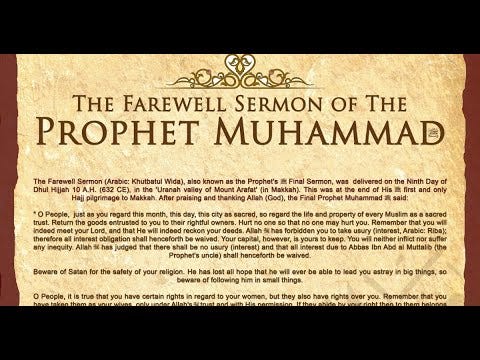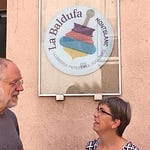Dhuʻl-Hijjah 9, the day before Eid al-Adha, is the anniversary of the Prophet's last sermon, delivered on Mt. Arafat. This famous sermon summarizes some of the most important tenets of Islam. Are we living up to them today?
This khutba was delivered three years ago on 9 Dhu’l-Hijra (July 8 2022).
So we're now in the season of the Hajj, and of Eid. All over the world, Muslims will be observing the great feast of the sacrifice, Eid al-Adha.
So in this khutbah, I'm going to talk a little bit about the significance of the Prophet's final khutbah. Prophet Muhammad (SAAS) delivered his last message in his final khutbah on the Valley of Mount Arafat not long before he passed away. And then in the second khutbah, I'll talk a little bit about the significance of Eid itself.
The Prophet's final sermon included his mention of Surah Al-Ma'idah, the third ayat, included the famous line,
اليوم أكملت لكم دينكم واتممت عليكم نعمتي و رضيت لكم الإسلام دينًا
which would translate as something like, “today I completed for you your religion and perfected for you the blessings and gave for you Islam your religion.”
So that (was the) day of perfecting Islam as the the nominal religion of the group of people who are following the final revelation from God, while also recognizing the validity of earlier revelations and the communities that follow those revelations, while still having a clear sense of the finality of the seal of revelations being this revelation of Islam, meaning that the Muslim community would be the foremost community in maintaining society so that the worship of God is the highest priority, and that the spiritual development of people is the highest priority of all social practices and rules. This is the inheritance that's what was left us by this final khutbah.
The final khutbah of Prophet Muhammad sallallahu alaihi wasallam included some statements that have echoed down through the centuries and that still guide Muslims. The pillars of Islam, what we now know as arkan al-Islam, are mentioned here.
The Shahada is mentioned in terms of worshiping God, because the translation in English would be: “oh, people, listen to me in earnest. Worship Allah, say your five daily prayers, and fast during the month of Ramadan, and give your wealth in zakah, and perform hajj if you can afford to.” So that's a passage from this final khutbah, and it lays out these five arkan al-Islam, these five pillars.
Another interesting passage reaffirms the Quranic banning of riba, or lending an interest, usury: “Allah has forbidden you to take usury, therefore all interest obligations shall henceforth be waived. “So just as the Quran tells us that God and his prophet have declared war on usury for all time, that absolute prohibition is again mentioned here in the final sermon on Mount Arafat.
Another key point raised in this final khutbah is that the prophet Muhammad is the final prophet, the last prophet, the seal of the prophets, and Islam is the seal of the divine revelations: “O people, no prophet or apostle will come after me and no new faith will be born. I leave behind me two things, the Qur'an and my example, the sunnah, and if you follow these, you will never go astray.”
That's a lot of key information about Islam in a very few words. So “no prophet will come after me. No new faith will be born.” So the final revelation here is this revelation of Islam. There were earlier prophets. We may assume that the Jews, the Christians, perhaps the Buddhists, at least some of the Hindus, the Taoists, Native Americans, Africans, and others have followed legitimate prophets— perhaps even the Greeks with some of their visionary thinkers. Who knows? But after this, there won't be any more. So there's no valid revelation creating a major religious community since then. And history seems to bear this out. All attempts to create whole new religions by people who have called themselves prophets have not worked out, have not created major world religions. The religion of Islam is the last of the great religions of the Axial Age, which began a thousand years before it and then ended with this great Islamic revelation. And scholars of comparative religion would pretty much agree to that, I think.
And then: “I leave behind me two things: the Quran and my example. If you follow these you'll never go astray.” Muslims have looked to this and taken this as kind of the guidelines for their sacred texts—the Qur’an being the direct word of God, and then the example, the sunnah, of prophet Muhammad, peace upon him. Trying to understand the word of God, we understand it through the example of the prophet.
There's one more I wanted to bring up, and that is equality under God. The prophet Muhammad SAAS said in his last khutbah, his farewell sermon, that “every Muslim is the brother of another Muslim. All mankind is from Adam and Eve. An Arab has no superiority over a non-Arab nor a non-Arab any superiority over an Arab. Also, a white has no superiority over a black, and a black has no superiority over a white, except by piety and good works. So learn that every Muslim is a brother to every other Muslim, and that Muslims constitute one brotherhood.”
So that unity and equality under God is a very important principle of Islam. And it's one reason that we don't have formal degrees of priesthood. Priests and bishops and archbishops and popes and things like that—we don't have that in Islam. We all go straight to God, and ultimately all people, male, female, black, white, from whatever ethnicity, are equal in the eyes of God, except in one thing, which is their degree of piety and good works.
And so these things have been preserved. These points have been preserved from the prophet's farewell khutba, down through today, and are the cornerstones of the religion of Islam. How well are we following these? How well are we preserving them? How well has the Muslim community done at not only remembering these things, but at actually implementing them? That's another question that I'll discuss in the second khutbah.
The Hajj
So the Hajj, the pilgrimage to Mecca, emphasizes the equality and brotherhood of Muslims that I just spoke about that was put so strongly, so profoundly, in the Prophet's farewell address. And that brotherhood is really the whole point, in a sense, or at least one of the biggest symbolic elements of the Hajj pilgrimage. Everybody shaves their head. Everybody puts on the same Ihram white garb. Everybody's supposed to be equal.
However, at the Hajj today, this emphasis on equality is maybe not quite what it should be. There are luxury hotels now for rich Hajjis. And then the poor hajjis can actually be staying in, I don't know if I would call it squalor, but in pretty difficult circumstances. Many people packed to a room or camping outside even in some cases. There's obviously no material equality, not even close to it. In fact, the level of material inequality today during the hajj is greater than it's ever been before in history, in the same way that the level of inequality today everywhere in the Muslim world and the rest of the world is probably greater than it's ever been.
Now, some people will say, but wait a minute, in the old days there were kings and princes and sultans who lived in luxury and splendor while their people lived in hovels if they were lucky. And these high-living powerful people spent their lives in dissipation, while the ordinary people worked and slaved and suffered and died. So how is that any different today?
Well, at one level, it isn't. But at another level…today, the kinds of dissipations available and the kinds of powers available to the powerful are off the charts compared to what they were a thousand years ago, or even 500 years ago or even 200 years ago or even 100 years ago. We don't need to get into the details, but... Clearly this extremely wealthy and powerful people today have access to all sorts of frivolous dissipations and decadent pleasures. And they have power over other people, technologies of power over other people, that didn't exist in the past.
Whereas for the poor and powerless today, not only are they still suffering and living in hovels and not having enough to eat and dying early easily preventable diseases, but they're also subjected to the power of the powerful in ways that they weren't before. Today, the powerful can surveil them from satellites. The powerful can chip them or put tracking devices on them or on their vehicles or what have you. (Though if they have vehicles, I guess they're not the poorest of the poor.) And the powerful can blow them up with drone attacks and hire hit men to go after them no matter where they hide in any quarter of this earth.
So the poor and the powerless, if they try to rise up for justice and truth, they're facing a much more difficult situation in some ways than in the past, because of this massively bigger difference between the powerful and the powerless. And we see this at the Hajj with these luxury hotels for the rich hajjis and then the very modest, if that, situations for the poor. Today, the Saudis earn about $8 billion per year on Hajj so-called tourism. They call it the tourism industry for Hajj. And these luxury hotels are bringing in a lot of that money.
Well, this year (2022) at least they are putting on the Hajj. There'll be about a million people doing it this year. Last year, there were only 60,000. And the year before that, 2020, the first year of the pandemic, there were 1,000. So they're back to a million. Before that, before the COVID hit, a little under 2.5 million people per year were coming.
Some think it's a bit shameful that this is a money-making venture for the host country and for the entrepreneurs who are building the luxury hotels and often tearing down the great monuments to do that. And I would have to agree. Again, the statement that an Arab is the equivalent of a non-Arab, there's no difference between the black and the white—this insistence on human equality which is supposed to come to a peak in the Hajj is is kind of missing here. And if we look at the Gulf Arabs: These are the people who are hosting the Hajj now. In some of these countries the non-Arab people who come to work there are treated little better than slaves. Unless, of course, they're non-Muslims. If they're kuffar, if they're rich kufar, especially rich Western kuffar, especially rich Western American kuffar, then they're treated like idols, like gods, and these supposed Muslims bow down to them.
So there are some things that have gone astray here in terms of implementing the message of the Prophet Muhammad’s (SAAS) farewell address.
And finally, the the usury part. Reminding us in the farewell address that we're at war forever with usury—and yet this whole pilgrimage industry that's grown up around the Hajj that puts the rich pilgrims in splendor and luxury is of course all operating on riba money. Indeed, the oil money from the Gulf has propped up the riba currency system by which every currency unit that exists—dollar, what have you—is lent into existence out of nothing, created out of nothing, and lent into existence at interest.
So we have a ways to go in implementing all of these principles.
Finally, as the Prophet Muhammad ended his farewell sermon by saying, he left behind two things, the Qur'an and Sunnah. Well, the greatest Sunnah he left behind, some say, is that he left no real inheritance, no body of wealth, just his wife's huts. That's pretty much it. Maybe a couple of minor household items. That's it. He was not interested in amassing wealth.
Are the people who are running the Hajj today in Mecca following that Sunnah? Maybe some of them. But quite a few of them obviously are not. So when we think about the Hajj and the ideals this stands for of equality and devotion to God, equality in this community of Muslims, surrender to Allah subhanahu wa ta'ala, in a state of absolute equality with other Muslims, we should be thinking about how to better implement this message and keep Islam alive even in these, what may be the akhiru zaman last days.












Share this post